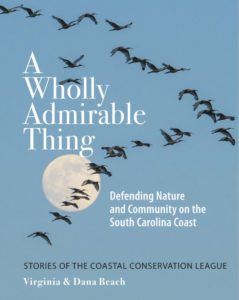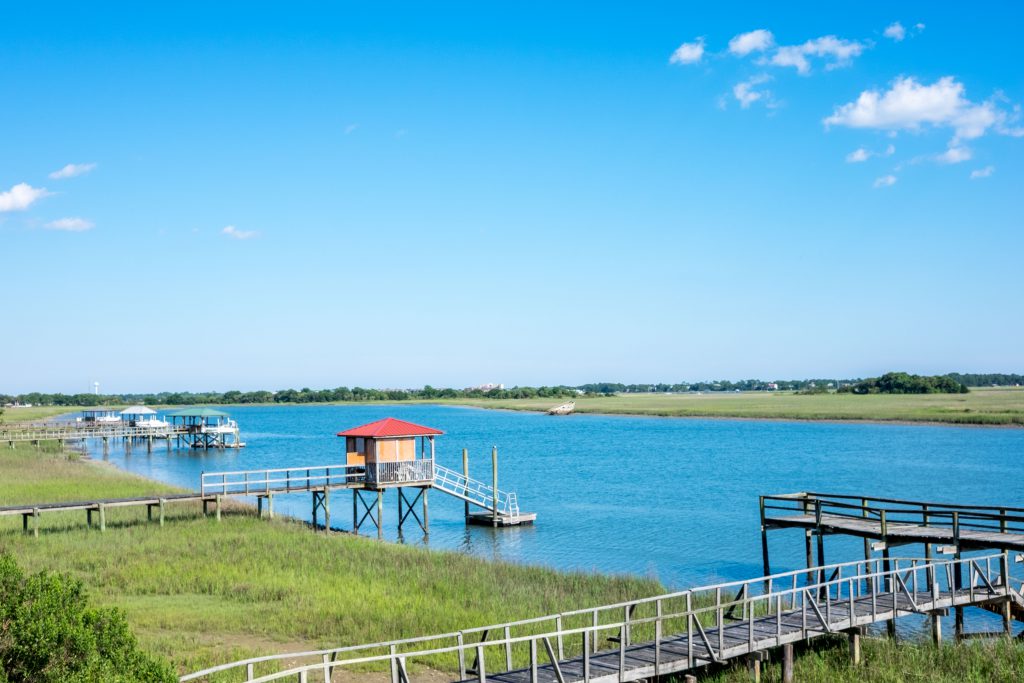By Andy Brack, editor and publisher | Conservationist Dana Beach years ago described how to keep development from mauling everything into a mess of sprawl.
 Don’t, he said, talk or write about merely “protecting land.” Instead, use words to conceptualize protecting “special places” in South Carolina. The first approach is kind of clinical and vanilla. It outlines what one wants, but doesn’t link to what someone else may really care about. But the second method connects conservation with a reader’s innate definition of keeping safe his or her own special place, whether it is a spot on a beach, a pristine stretch of river, a favorite area to see birds, a trail in the mountains. In other words, it allows the reader to be involved in framing the concept
Don’t, he said, talk or write about merely “protecting land.” Instead, use words to conceptualize protecting “special places” in South Carolina. The first approach is kind of clinical and vanilla. It outlines what one wants, but doesn’t link to what someone else may really care about. But the second method connects conservation with a reader’s innate definition of keeping safe his or her own special place, whether it is a spot on a beach, a pristine stretch of river, a favorite area to see birds, a trail in the mountains. In other words, it allows the reader to be involved in framing the concept  of what protection means.
of what protection means.
In a new book that tells 10 conservation success stories in South Carolina over the last 30 years, Beach and his wife Virginia share keys to keeping a lot of the Palmetto State’s special places safe from threats of sprawl, development and, in one sense, human greed.
“A Wholly Admirable Thing: Defending Nature and Community on the South Carolina Coast” is more than a remembrance of 30 years of conservation work by Beach and the Coastal Conservation League. It’s a celebration of how people — Republicans, Democrats and political independents — can work together to make South Carolina a better, friendlier place by keeping what attracts us here in first place.
When the League got off the ground just before Hurricane Hugo slammed into South Carolina in 1989, Beach envisioned better laws and state policies, better rules for land use and more public education about the “long-term needs of our coastal environment.”
He didn’t necessarily envision working with affiliated people and groups, such as the Nature Conservancy, Ducks Unlimited, the S.C. Environmental Law Project, the Southern Environmental Law Center and various land trusts, to help to establish a 1.25 million-acre greenbelt of permanently protected Lowcountry land around urban boundaries to safeguard marshes, small islands, maritime forests, birding areas and more.
He didn’t expect the nascent organization to evolve to fight battles over factory hog farms, polluting coal plants, an expanded port or a highway that would have split a national forest. But he and colleagues fought those battles as described in the bulk of the book, which focuses on successes, such as preservation education at the Penn Center on St. Helena Island, saving Sandy Island in Georgetown County, nurturing local farmers to grow and sell $7 million of vegetables through the GrowFood Carolina network, and embracing concepts of new urbanism to bolster density and new ways to live in better harmony with the coast.
“A Wholly Admirable Thing” is a lyrical chronicle of successes for organizing and defending South Carolina’s special places. It’s a tribute to persistence. The book’s stories inspire awe, surely even among detractors who have cursed the League over the years.
But students of politics will also enjoy Dana Beach’s succinct, realistic description of the murkiness and challenges of Palmetto politics in the book’s introduction:
“Politically, South Carolina is bright red; but the state is neither conservative nor liberal, at least by conventional definitions of those terms. Instead it is a pre-modern, tribal society controlled by a network of friendships, kinships and business relationships with power vested in a small leadership clique that migrates across the rural landscape — from Edgefield and Barnwell, St. Matthews to Moncks Corner, Kingstree to Florence. It is a modern manifestation of a corporate state, like those that exist in Eastern Europe.
“Our temperament is one of wounded honor and easily hurt feelings. Just below the good-natured, jovial countenance of a South Carolina leader, lies a tightly wound, tender bundle of emotions waiting to explode.”
It’s much the same today in the legislature as it was 50 years ago or 150 years ago. In some sense, it doesn’t matter whether Republicans or Democrats are in control because what really shapes the state is a continuing heritage of political elites who don’t want to be told what to do. “A Wholly Admirable Thing” is a critical read for anyone who wants to get something actually done.
- Have a comment? Send to: editor@charlestoncurrents.com





 We Can Do Better, South Carolina!
We Can Do Better, South Carolina!
























